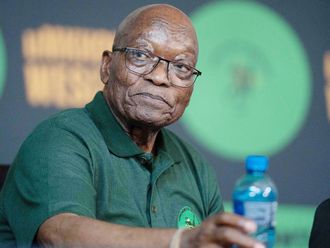Libreville: A new interim government was installed in Gabon on Friday, three days after the former administration resigned over delays in holding legislative elections, a presidency official said.
Prime Minister Emmanuel Issoze-Ngondet announced a new government days after the constitutional court forced the dissolution of the previous one, with the ruling party retaining control of key ministries.
Issoze-Ngondet, who was reappointed as prime minister on May 3 by President Ali Bongo, moved Regis Immongault Tatangani, the former economy minister, to foreign affairs. He is replaced by Jean Marie Ogandaga, the former minister of public affairs. Other former ministers retained their posts and two opposition party members also got cabinet positions for housing and for trade.
The government and the parliament were forced to dissolve by the country’s constitutional court because legislative elections weren’t held by April 30 as required by law. The oil-producing central African nation has been governed by Ali Bongo since succeeding his father in 2009.
The incoming government will remain in office until the elections, delayed since December 2016, are held.
There is still no date for Gabonese voters to go to the polls.
On Monday Gabon’s constitutional court dissolved the national parliament and called on the government to step down, criticising its failure to organise the legislative elections.
According to the court, the government should have organised the twice-delayed polls by the end of April.
The government duly resigned on Tuesday.
The new interim government, which has 40 ministers and deputy ministers, includes seven opposition figures.
With no parliament in place, the government now refers solely to the President Ali Bongo.
The legislative elections are unlikely to take place before July at the earliest, according to commentators.
Bongo’s re-election in 2016 led to opposition accusations of electoral fraud and days of deadly violence. He took over power from his father Omar Bongo, who had ruled for 41 years until his death in 2009.
The country has large oil, mineral and tropical timber resources, and its per-capita national income is four times greater than that of most sub-Saharan nations.
But about a third of its population of 1.8 million still live below the poverty line - the result, say experts, of inequality, poor governance and corruption.












